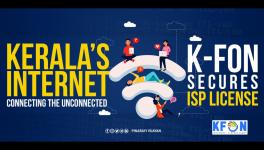TRAI Seeks Views on Privacy, Security in OTT Services Regulation

The Telecom Regulatory Authority of India (TRAI) has invited suggestions from stakeholders on regulating over-the-top (OTT) services, which could raise some concerns.
In a ‘Consultation Paper on Regulatory Mechanism for Over-The-Top (OTT) Communication Services and Selective Banning of OTT Services’, instead of shutting down the entire Internet, released on Friday (July 7), TRAI started consultation on the regulation of such services.
TRAI has sought written comments from stakeholders by August 4 and counter-comments by August 18.
TRAI has argued that while telecom operators and OTT services like WhatsApp offer similar services, they are not bound by the same requirements. Telecom operators have demanded regulating OTT services for years.
While “…telecom service providers (TSPs) need a telecommunication service licence under Section 4 of the Indian Telegraph Act, 1885, to offer telecommunication services to their consumers through telecommunication networks … OTT communication service providers offer voice call, messaging and video call services similar to the services provided by TSPs without any such licence,” the consultation paper reads.
Of particular concern is the TRAI asking for suggestions on what provisions should be made in a licensing/regulatory framework(s) for OTT communication services regarding “lawful interception”, “privacy and security” and “customer verification”, among others.
Lawyer and Internet Freedom Foundation founder-director Apar Gupta raised concerns about “lawful interception” and “customer verification” and “issues relating to selective banning of OTT Services”.
“These are serious questions that may prompt regulatory proposals leading to further eroding privacy of users, end-to-end encryption on platforms such as Signal and WhatsApp and formalise a whitelisting approach in which bans are made on a class of services that provide communication services such as even social media messaging and sharing. I encourage more people to read this paper and participate,” he tweeted.
“The wrong recommendations to these queries have the potential to significantly damage the digital rights of ordinary Indian users,” he added.
TRAI has also asked for a detailed. views on the “security” and “privacy” aspects of OTT communication services vis-à-vis licensed telecommunication services.
Surprisingly, the regulatory authority recommended against regulating OTT communication services like WhatsApp, Zoom and Google Meet in September 2020.
“It is not an opportune moment to recommend a comprehensive regulatory framework for various aspects of services referred to as OTT services beyond the extant laws and regulations prescribed presently,” TRAI had said.
The latest development comes after the Department of Telecommunications (DoT) requested TRAI to reconsider its September 14, 2020 recommendations on a regulatory framework for OTT communication services in a letter dated September 7, 2022.
In the letter, DoT suggested a suitable regulatory mechanism for OTTs, including issues relating to a ‘selective banning of OTT services’ as part of its recommendations.
“Whereas TRAI has recommended that ‘No regulatory interventions are required in respect of issues related with Privacy and security of OTT services at the moment’, it has not provided any detailed justification for recommending the same,” the letter read.
“In view of the humongous growth of OTT services in the recent past and these services having reached a matured stage, there is a need to holistically look into the various aspects of these services, including regulatory, economic, security, privacy, and safety aspects,” the DoT further wrote.
Regarding the selective banning of OTT apps, as opposed to the whole Internet, the TRAI contended that the shutdown of telecommunications or the Internet can have “significant ramifications for a country’s economy”. “It also disrupts critical services such as education and healthcare. Consequently, such a shutdown affects the life and livelihood of the citizens of the country,” it said.
Get the latest reports & analysis with people's perspective on Protests, movements & deep analytical videos, discussions of the current affairs in your Telegram app. Subscribe to NewsClick's Telegram channel & get Real-Time updates on stories, as they get published on our website.
























